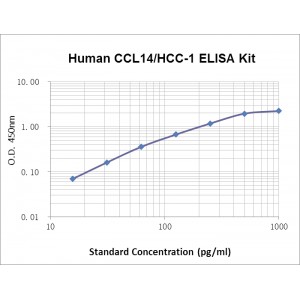More info
Assay Range | 15.6--1000 pg/mL |
Sensitivity | 10.0 pg/mL |
Size | 96T |
Storage | Store at 2 - 8ºC. Keep reconstituted standard and detection Ab at -20 ºC |
Assay Principle | Sandwich ELISA |
Sample volume | 100 µL final volume, dilution factor varies on samples |
Detection Method | Chromogenic |
Kit Components
1. Recombinant Human CCL14 standard: 2 vials
2. One 96-well plate precoated with anti-Human CCL14 Ab
3. Sample diluent buffer: 12 mL - 1
4. Detection antibody: 130 µL, dilution 1:100
5. Streptavidin-HRP: 130 µL, dilution 1:100
6. Antibody diluent buffer: 12 mL x1
7. Streptavidin-HRP diluent buffer: 12 mL x1
8. TMB developing agent: 10 mL x1
9. Stop solution: 10 mL x1.
10. Washing solution (20x): 25 mL x1.
Background
Chemokine (C-C motif) ligand 14 (CCL14), also known as CCL14a or HCC1 (hemofiltrate CC chemokine 1), is a small cytokine belonging to the CC chemokine family. CCL14 is synthesized as a 93 amino acid (aa) precursor protein containing a 19 aa signal peptide and a 74 aa secreted protein. Different post-translationally modified CCL14, including O-glycosylated and N-terminally truncated variants of CCL14 have been identified. Generation of the CCL14 precursor to active peptide is mediated by the urokinase type plasminogen activator or plasmin. An alternatively splice isoform named HCC3/CCL14b has also been described. CCL14 is expressed constitutively in various normal tissues including spleen, liver, muscle, gut and bone marrow. It circulates at very low concentrations in human plasma. The 74aa CCL14 shows weak activities on human monocytes through binding to CCR1, but does not induce their chemotaxis. The proteolytically processed CCL14 (aa 28- 93) is a potent agonist of CCR1, CCR3, CCR5, it promotes chemotaxis of T lymphocytes, monocytes and eosinophils, and inhibits infection of mtropic HIV type 1.


